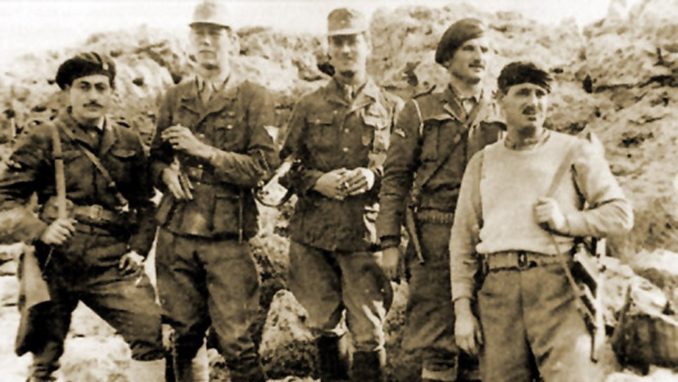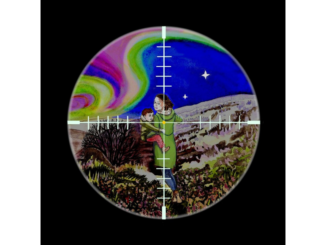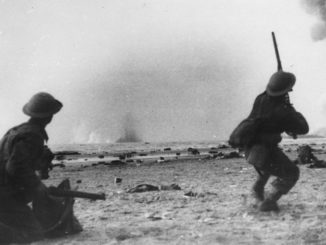
Gabriella Bullock, CC BY 3.0, via Wikimedia Commons
Frequenters of Going Postal, being a generally knowledgeable lot, may well have heard of Patrick Leigh Fermor and, if not, will probably be familiar with the war film ‘Ill Met by Moonlight’ (starring Dirk Bogarde) which is based on real events of wartime daring do in which a British commando unit kidnaps the commander of the German garrison of occupied Crete and smuggles him off the island to Egypt. The film is actually pretty faithful to the real story and the commander of the British unit was Patrick Leigh Fermor. By the way, if you want to read an excellent account of the mission, I’d recommend Wes Davis’ ‘The Ariadne Objective’ which recounts the full backstory and the aftermath as well as the incredible nature of the successful mission.
Patrick Leigh-Fermor was quite the most extraordinary man, from a privileged class but without much money, a wild and almost bohemian childhood farmed out to and successively expelled from one school to another from which he emerged barely educated but with a real love of the Classics, a desire to be a writer and an ear for foreign languages. Most of all he had a natural charm which won the friendship of foreigners of many nationalities. A kind of unaffected English gentlemen who emerges unscathed from almost any situation while retaining a natural calm.
Finishing education at the age of 18 and with no clear idea of his future, he conceived a desire to walk on his own from London to the then Istanbul/Constantinople in 1933 just as the Nazis were coming to power, taking him through the Netherlands, Germany, Central and Eastern Europe. He had a small allowance, barely enough to keep body and soul together, had to learn the native languages as he went and only had a rough idea of his route. With various detours, he finally arrived at his destination in late 1934, and then decamped for an extended stay on Mount Athos, the Orthodox monastic autonomous republic within Greece. Subsequent to that he returned to Romania to live with his lover, a beautiful Graeco-Romanian princess (much of the Romanian nobility were Greek speaking and descended from Byzantine families), leaving at the start of the Second World War to join up.
Someone with his background, his knowledge of some of the languages and the countries of Eastern Europe was always going to end up as an officer in special forces or SOE and so he did, in occupied Greece, a country and people who he came to love and where ultimately made his home after the war in the Outer Mani, the southernmost peninsular of the Peloponnese, at Kardamyli where he built a house.
He wrote a series of books about Greece and other things of interest – if spared, I hope to write a review of his book about his travels in the early post War Mani, the most extraordinary and beautiful piece of writing about this remote and highly idiosyncratic part of the old Greece, now largely expunged by ‘progress’, tourism and EU funded ‘development. When I went there in the early 1980s the Mani was still largely inaccessible due to its terrible roads and few places to stay; today now much changed sadly. The Mani then had more in common with the Greece of Homer in some ways than the second half of the twentieth century, with the addition of extraordinary multi generational clan feuds, tower fortress houses, a strong attachment to Orthodoxy and being the still beating heart of Greek Royalism.
But, despite his writing success he didn’t write about perhaps his most formative experience – his travels through Europe in 1934 and 1935 – until his last years. This was perhaps because he had had his diary of the first stage of his trip stolen in Munich in 1934 but was encouraged by his wife and his publisher to write it from memory. The first volume – ‘A Time of Gifts’ – covers his journey to the Austro-Hungarian border, was published in 1977 to immediate acclaim.
The second volume – ‘Between the Woods and the Water’ – dealing with his travels in Hungary and across Transylvania and the Carpathian highlands to the Iron Gates of the Danube – was published a few years later. He never finished or published the final volume – ‘The Broken Road’ – about his travels through Romania and Bulgaria, to Constantinople and then Mount Athos; that was edited and published posthumously, due to writer’s block and then the death of his beloved wife Joan. He died in 2011 at the age of 96. As a footnote, one of my work colleagues told me he once met ‘Paddy’ as everyone called him at the Special Forces club in London chatting with some of his old wartime comrades. He says there was something about his presence.
During the three books we see him change from a wild, naïve young boy-man of 18 into an accomplished man of the world who can get by, even succeed, in almost any alien situation. He always had the potential – one of his schoolmasters describing him as ‘a dangerous mix of sophistication and recklessness which makes one anxious about his influence on other boys’ – and he was blessed with good looks, charm and the ability to make friends. By the culmination he has lived for a while on Mount Athos as a guest of the monks and was embarking on a love affair with a Romanian Byzantine princess.
All these things would make the trilogy a good read, but some other things set it apart and for me make it simply the most wonderful travelogue I have ever read. The first it is a glimpse of a pre-modern Europe in its last years, before the coming of Nazism, communism, consumerism, technology, mass travel, especially the later sections on Eastern Europe. It’s a world of vivid colour, ancient traditions and continuities going back centuries, agrarian life-styles even older, the surviving relics of Byzantium still breathing (just). He doesn’t need to and didn’t make it romantic, it was, even if very hard for most.
For me the thing that emerges most is the joy of life, of existing, of loving, of encountering, of seeing beauty, ancient things persisting, cultures not preoccupied with getting money, combined with a vicarious insecurity of never being sure where your next meal or overnight stay is coming from. It’s life on the edge, its colours intensified. One can see how he became addicted to all of these things and why he became such a good commando leader and how as the Sun came up while holed up in a cave on Mount Ida with the captured German General Kreipe, the German army searching all around, he could still mutter a quote from Homer in the Greek, only to have the quote completed by the classically educated Kreipe standing near him. It was a bonding moment, something that reminded them of an ancient shared European heritage and engendered a mutual respect.
The other thing that is remarkable is the sheer quality of his writing. It’s descriptive, but never verbose, beautifully poised and elegant, it doesn’t dominate the material, it illustrates it and elucidates it. Many say he was the best written English stylist of the twentieth century. It’s hard to disagree, partly because it feels so natural, never crafted although it surely was. He somehow always finds the words and pace to suit the scene, whether romantic, practical, awestruck, uncertain – it all just happens seamlessly. And at times its majestic, magical and hyper romantic – his description of his visit to the Abbey at Melk on the Austrian Danube is perhaps the exemplar, for example:
“…Cloisters developed with the complexity of double, triple and quadruple fugues. The suites of state apartments concatenated with the variety, the mood and the décor of symphonic movements. Among the receding infinity of gold bindings in the library, the polished reflections, the galleries and the terrestrial and celestial globes gleaming in the radiance of their flared embrasures, music, again, seemed to intervene…”
It’s never onerous to read, but joyful, light and conjures up a wonderful mind image of what he was himself seeing and experiencing. It’s influenced my own writing. Prose can encompass and incorporate aspects of poetry, it should call forth an emotional imaginative response from the reader, not just a merely functional description. There’s a playfulness of words and language entwined within the narrative of the trilogy, but it never feels like the author showing off: it never renders the account verbose or long winded. It’s beautifully judged writing from a genius. That he was a semi educated young man, a self-taught lover of the Classics, is perhaps not a surprise. An effective, formal education might have knocked it out of him.
The books are never boring. They go at the pace of the people he meets, the things of interest he sees on his journey. Some stages fly by, others get much fuller attention. And he experienced all, the theft of his ruck sack in Germany, having no money, sleeping in barns and palaces as the guest of the local aristocracy, mixing with peasants, thieves and princesses. An affectionate and kaleidoscopic view of a Europe just about to be swept away. There’s an unspoken atmosphere of eulogy about a world he saw just before it was lost, but it’s not sad, poignant yes, but joyful too because that world was still alive, still breathing, still loving, still looking to a future it would not have, still maintaining its continuities of history and culture. All this from these three extraordinary books by an extraordinary man who loved what he saw but who remained a true English patriot and genuine hero. I love them, they’re magical, romantic, wonderful and real in technicolour.
Not for nothing did a BBC journalist describe Patrick Leigh-Fermor as “a cross between Indiana Jones, James Bond and Graham Greene.” Personally, I prefer him to Greene as a writer, and he was a flesh and blood writer and man of action, not a fictional character, perhaps the last warrior epic poet we have produced. A man who lived his life as an epic poem and perhaps, at bottom, spent his life searching for something remaining of Byzantium, Romaioi, the last ‘Romanness’ and ‘Roman Greeks’ who lingered on long after the fall of Constantinople in Eastern Europe and parts of the Near East. That’s what he journeyed across Europe in 1933 and 1934 to find, perhaps unconsciously, and for a time he found them. His books record his search and what he found and loved.
Amazon book link: Patrick Leigh Fermor Trilogy Series 3 Books Collection Set (A Time of Gifts, Between the Woods and the Water, The Broken Road)
© JD de Pavilly 2021
The Goodnight Vienna Audio file
Audio Player


